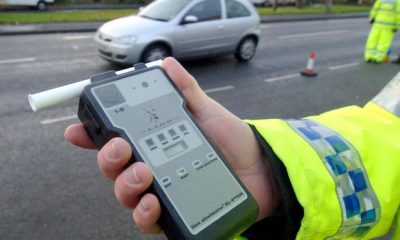Crime
Teenage girl on trial for attempted murder at Ammanford school stabbing

A 14-year-old girl accused of attempting to murder two teachers and a fellow student at Ysgol Dyffryn Aman in Ammanford has appeared in court as her trial began today. The defendant, who cannot be named due to her age, has pleaded guilty to three charges of wounding with intent and possession of a knife on school premises but denies three counts of attempted murder.
The trial, held at Swansea Crown Court before Judge Paul Thomas KC, opened with Prosecutor William Hughes KC describing the incident on April 24 as a “serious episode of violence.” He detailed how the defendant approached teacher Fiona Elias in the school yard that morning, giving her what was described as a “sinister look” before producing a silver blade from the pocket of her cargo pants.
The court heard that during the morning break, the defendant attacked Mrs Elias with a multi-tool knife, reportedly shouting, “I am going to f kill you.” As Mrs Elias attempted to defend herself, fellow staff member Liz Hopkin intervened, grabbing the defendant from behind in an effort to restrain her. In the ensuing struggle, the defendant dropped the knife momentarily, but quickly retrieved it and continued the attack, stabbing Ms Hopkin multiple times.
After injuring the two teachers, the defendant moved towards a teenage student, calling out her name and shouting, “I am going to kill you.” The student was knocked to the ground and suffered stab wounds to her back and minor injuries to her legs. Other members of staff and students became aware of the commotion, and two male staff members – Darrell Campbell and Stephen Hagget – approached the defendant in an attempt to calm her. Witnesses described the defendant as having “a vacant look on her face” throughout the incident.

The prosecution outlined that the defendant had a history of bringing a knife to school. Earlier in the academic year, Mrs Elias had discovered a small kitchen knife in the defendant’s bag, which led to a school policy requiring the defendant to undergo daily bag checks. However, on the day of the attack, the defendant left home before her father could conduct the usual check, taking the fishing multi-tool without his knowledge.
Mrs Elias suffered stab wounds to her arms and thumb. Ms Hopkin sustained the most serious injuries, including wounds to her leg, the rear of her left chest, and a stab wound at the top of her neck into the trapezius muscle. The teenage victim received wounds to her back and legs. Emergency services arrived at the school shortly after the attack, and Mrs Elias and the student were taken to Morriston Hospital in Swansea. Ms Hopkin was airlifted to the University Hospital of Wales in Cardiff. All three victims were discharged from hospital the following day.
Following the defendant’s arrest, police conducted a search of her home. Among the items found was a school planner with the phrase “death before dishonour” and other writings, including the phrase “cutting mouths and eyes to death.” Mr Hughes told the jury that these items suggested the defendant’s intention on the day of the attack.

During her arrest, the defendant made several comments, which the prosecution argues are significant in understanding her mindset. In the back of the police vehicle, she reportedly asked, “Are they dead?” and stated, “I am pretty sure this is going to be on the news… more eyes will be on me… that’s one way of being a celebrity.” She also queried how she would face her family after what had happened. However, when interviewed by the police in the presence of her father, she exercised her right to respond with “no comment” to all questions.
The jury was shown CCTV footage from the school depicting the attack, along with mobile phone footage shot by students and footage from police body-worn cameras. These videos provided the court with a detailed visual account of the incident. The judge instructed the jury that special screens would be installed to allow them to view the footage up close as part of the evidence.
Prosecution emphasises intent
Prosecutor Mr Hughes KC explained that while the defendant does not dispute stabbing the three victims or bringing the multi-tool to school, the issue the jury must consider is whether she had the intent to kill. The jury was informed they would need to evaluate each case individually to decide if the defendant intended to commit murder.
It was revealed in court that the defendant had previously been caught with a small kitchen knife at school, resulting in her parents agreeing to subject her to daily bag searches. On the day of the incident, she had left home early, avoiding these checks. The court also heard that the defendant had made concerning drawings and notes, including references to violence against others.
After the prosecution outlined the case, proceedings for the day concluded. The trial will not sit on Tuesday, with hearings scheduled to resume on Wednesday when the jury will hear further evidence.
The 14-year-old defendant was arrested at the scene following the attack. Emergency services quickly arrived at Ysgol Dyffryn Aman, placing the school on lockdown. Both Mrs Elias and Ms Hopkin have since expressed gratitude for the support they received from the school community. The trial, expected to last two weeks, will continue to explore whether the defendant intended to kill her victims, as charged.

Crime
Man charged with attempted murder after Carmarthen park incident

57-year-old due in court following alleged knife and stalking offences
A MAN has been charged with attempted murder following a serious incident in Carmarthen town centre last week.
Dyfed-Powys Police confirmed that James McKenna, aged 57, from Carmarthen, has been charged with attempted murder, possession of a bladed article in a public place, and stalking.
The charges relate to an incident in Carmarthen Park on Thursday (Jan 29), which prompted a significant emergency services response and caused concern among residents.
Police have not yet released full details of the circumstances, but officers were seen in and around the park area for several hours following the incident while enquiries were carried out.
McKenna is due to appear before Llanelli Magistrates Court on Thursday (Feb 5).
The Herald understands the case involves allegations of both violence and targeted behaviour towards an individual, with stalking listed among the charges.
Public concern
Carmarthen Park is a popular and busy public space used daily by families, dog walkers and joggers, and incidents of this severity are rare.
The news has prompted concern locally, particularly as the alleged offences include possession of a knife in a public place.
Residents have previously raised questions about safety in parks and open spaces across west Wales, especially during darker winter evenings.
Court proceedings
At this stage, the charges remain allegations and the case will now proceed through the courts.
Magistrates will decide whether the case is sent to Crown Court due to the seriousness of the attempted murder charge.
Further details are expected to emerge during Thursday’s hearing.
The Herald will be attending court and will provide updates as they become available.
Crime
Sex offender jailed after living off grid in Pembrokeshire and refusing to register

Man walked into police station after months avoiding authorities
A CONVICTED sex offender who told police he intended to live “off grid” rather than comply with legal monitoring rules has been jailed after handing himself in at a Pembrokeshire police station.

Christopher Spelman, aged 66, of no fixed address, appeared for sentence at Swansea Crown Court after admitting breaching the notification requirements of the sex offenders register.
The court heard Spelman was released from prison in Dorset on July 4 last year but immediately refused to provide police with an address, despite being legally required to do so within three days.
Instead, he indicated he planned to buy a tent and live outdoors.
Prosecutor Brian Simpson said officers subsequently launched a nationwide search when Spelman failed to make contact with police. Public appeals were issued and his case featured on the television programme Crimewatch.
Detectives believed he had been travelling around the UK using public transport and staying at campsites. He was known to have links to several areas including Merseyside, Manchester, Devon, Cornwall and Hampshire.
His whereabouts remained unknown until January 3 this year, when he walked into Haverfordwest police station and was arrested. It is unclear how long he had been in Pembrokeshire.
Spelman previously served seven years in prison after being convicted in 2014 of 12 counts of sexually assaulting a girl under the age of 14. He was placed on the sex offenders register for life.
The court heard this was not the first time he had failed to comply with the rules. After an earlier release in 2016, he again failed to register his address and avoided police for around five years before being caught.
He has 11 previous convictions for 29 offences.
Defence barrister Andrew Evans described the case as unusual and said his client had long disputed his original conviction and had expressed a wish to live “outside society”.
However, he said Spelman had gradually accepted that he remained subject to court orders and now wanted more stable accommodation and a chance to rebuild his life. The defendant asked the court to impose a custodial sentence so arrangements could be made for his future release.
Judge Geraint Walters noted there were signs Spelman wished to change but warned that any further breaches would result in longer prison terms.
With credit for his guilty plea, Spelman was sentenced to 10 months in prison. He will serve up to half in custody before being released on licence.
Crime
Former Wales rugby star admits Christmas Day drink-driving offence

Ex-Ospreys captain was almost twice over limit in Pembroke town centre
Former Wales back row Jonathan Thomas has admitted driving through Pembroke town centre on Christmas Day when he was almost twice over the drink-drive limit.
This week Haverfordwest magistrates heard that Thomas, 43, was stopped by officers as he drove his Mercedes CLA 220 along The Green, Pembroke, at around 5pm on Christmas Day.
“The officers were very concerned at the manner of his driving, as the car was being driven erratically and was swerving to the other side of the road,” said Crown Prosecutor Sian Vaughan.
“When Jonathan Thomas got out of the car, the officers could see that he was having difficulty standing and was unsteady on his feet.”
Subsequent breathalyser tests showed Thomas had 62 mcg of alcohol in his system, the legal limit being 35.
Thomas, who has no previous convictions, pleaded guilty to the drink-drive charge and was represented in court by solicitor Jess Hill.
“He has family in the area and had travelled to spend time with them on Christmas Day,” she told the magistrates. “He’s very remorseful for his actions and hugely regrets his decision that day.”
Jess Hill concluded by saying that Thomas is currently “between jobs and living off his savings”.
Thomas, who gave his address as Main Road, Bredon, was disqualified from driving for a total of 18 months.
“The length of your disqualification reflects the fact that you were more than a little bit over the limit,” commented the presiding magistrates when imposing sentence.
He was fined £120 and ordered to pay £85 costs and a £48 court surcharge.
The former Wales back row left his role as Swansea RFC head coach at the beginning of December 2025 as a result of ongoing health concerns. He was forced to retire from playing in 2015 on medical advice after being diagnosed with epilepsy and is one of the 390 former rugby union players currently taking part in a concussion lawsuit against the sport’s authorities.
“Long-standing issues linked to the head trauma have caused me some concern recently and it has been impossible for me to give the role everything it needs,” he said in a previous interview with the BBC.
His rugby career started out with Pembroke RFC juniors before moving to Swansea RFC, which he captained when he was 19. He then joined the Ospreys where, over a ten-year period, he won four league titles and an Anglo-Welsh Cup. He was the youngest player to captain the Ospreys and, at the time of leaving, was the joint highest appearance holder, together with Andrew Bishop, on 188 appearances.
His international career saw him play for Wales at Under-16, Youth, Under-19, Under-21 and Sevens levels. He made his senior international debut against Australia in 2003, featured at the 2007 Rugby World Cup and was part of two Six Nations Grand Slam-winning sides in 2005 and 2008. Between 2004 and 2011, Thomas was included in every Wales Six Nations squad. In his appearances for Wales, he scored seven tries.
-

 Health6 days ago
Health6 days agoConsultation reveals lack of public trust in health board
-

 News2 days ago
News2 days agoPrincess of Wales visits historic Pembrokeshire woollen mill
-

 Crime5 days ago
Crime5 days agoPembroke man accused of child sex offences sent to Swansea Crown Court
-

 Community7 days ago
Community7 days agoCampaign to ‘save’ River Cleddau hits over 2,200 signatures
-

 Health3 days ago
Health3 days agoDoctor struck off after sexual misconduct findings at Withybush Hospital
-

 Community5 days ago
Community5 days ago50s women threaten legal action over pension compensation refusal
-

 Business6 days ago
Business6 days agoEight-year prison sentence after vehicle stop uncovers drugs worth over £150,000
-

 Crime1 day ago
Crime1 day agoHakin man’s appeal delayed again as Crown Court seeks guidance on insurance law






































